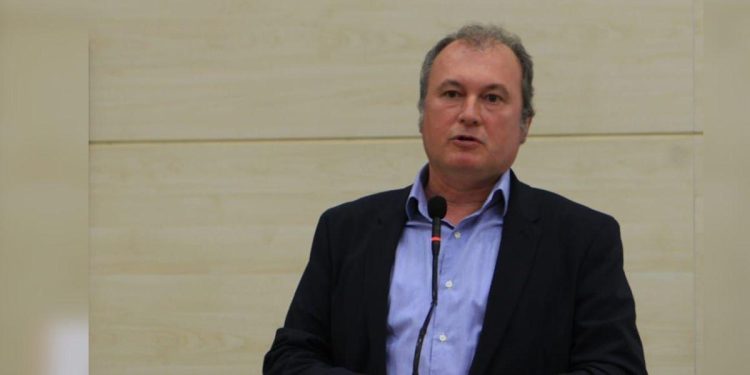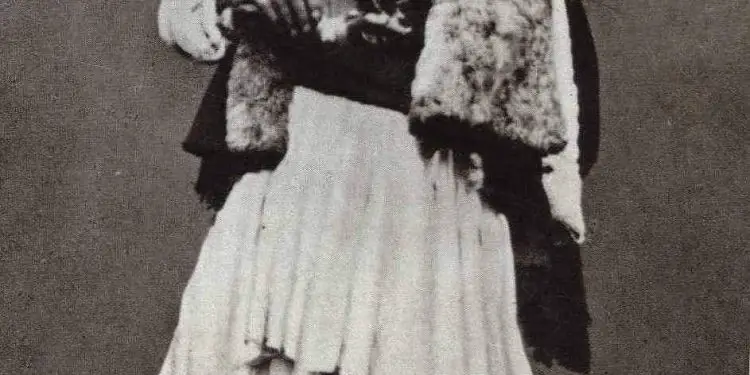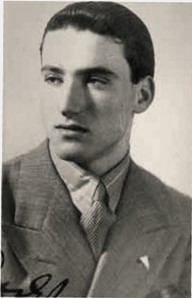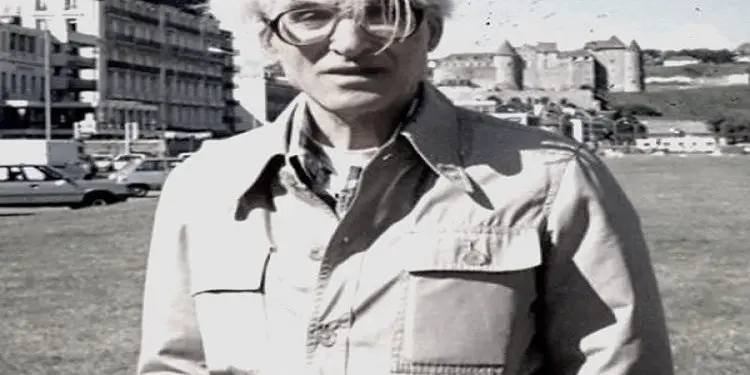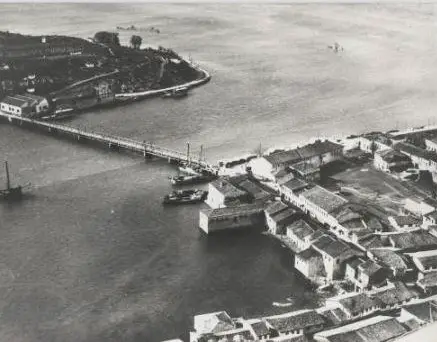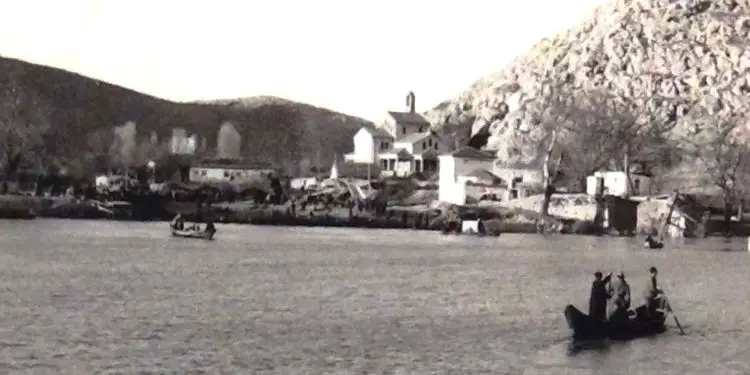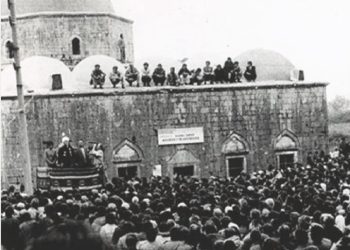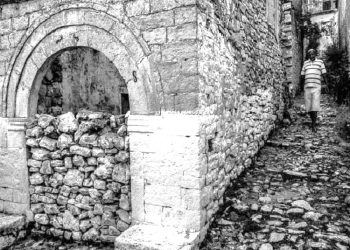By Gëzim Puka
Memorie.al / “Let the kanga be sung, man”! This is how men in our mountains greeted each other when they performed an act of bravery or forgiveness. The song meant an introduction to history or, at most, to the history of oral literature. You would always remain there. There was glory. A folk song was created in Shkodër, which was later published in “Zana populërë”, under the care of the diligent folklore collector, Kasem Taipi. Later, a poem was written by Arshi Pipa. A photograph is preserved in the “Marubi” photo library, while in an old neighborhood; one of the streets bears the name of a character that performed a rare act in the history of the city. The fascination with this feat and this character made possible Fadil Krajë’s best novel; “Britma e një gruaje”, which would have this event as its plot.
Monumental urban work; “Shkodra and the Weather”, simply and neatly narrated by the author of that precious memory, Hamdi Bushati, there was no way to forget a character like Kupe Danja. “At that time, Kupja was an elderly man, but with the heart of a brave young man, as he showed with his act. He lived in the ‘Perash’ neighborhood. It was hot weather. He was leaving his house. At that moment, he saw two Catholic women, covered with sheets, according to the custom of the time, hurrying down the Qafhardhisë Street.
They were coming from the ‘Tepe’ neighborhood. It is said that they were two tobacco workers. These two women were being followed by two Turkish soldiers, for low purposes. Luckily, they noticed that a Shkodra man appeared on the road in front of them: Both of them shouted at him loudly: ‘In your hands, because our erzi is being taken today’! At this moment, Kupja gathered herself before that difficult situation and “made up her mind”, as the people say, to act with courage and determination. It was better for her to die with honor than to destroy herself and Shkodra.
The confused soldiers probably did not think that the old man would shoot at them; they did not appreciate the man of Shkodra at all, but rushed at the women. Then Kupe Dane had no choice but to light the sabers he had on his belt at those shameless people. Kupe’s saber knocked down one of them, the other hit Kupe, but he was faster and knocked him to the ground with his second saber. The two Catholic women escaped unharmed, from the claws of the lustful.”
Marubi has captured an old and slender man in the photograph. Kupe Danja of the photograph in old age, in simple folk clothing, seems to have retained the unbending gaze of youth. His image continues to convey the certainty of the manly act. A hero is a normal man, who does the most necessary thing in the most difficult circumstances.
Immortality came with verses. The creation of the meaning of this figure emerges more clearly through folk verses about the man who committed an act of heroism. The attempt to dishonor the woman was the cause of the murder. It was not a premeditated or warned murder, but completely deserved.
Meanwhile, contact with the folk literary text builds in our imagination the character Kupe Danja, as the complete embodiment of the romantic qualities that this hero carries. The song and its sweet melody have continued to transmit the joy of pride.
“Kupe Danja says the poor thing,
I was in danger without thinking,
I went on the road and the army came out,
A woman of the cheshens came to take me
Kupe, their eyes are tearing,
What brought trouble to the ved,
I made a fool of myself,
To spit on the erzin of the vilayet.
I didn’t like Katil-llekun,
But fate has it that way,
Because we have erzin together,
As much as the cheshens,
…With such a thing I ended it,
For the danger that has befallen me,
As much for the decency as for the spitting,
In the store I was invited”!
On the same wavelength, Arshi Pipa’s poem, written in 1950 in the Gjirokastra prison, has continued to convey the human message of coexistence. Kupe Danja has sublimated this national bond of ours. The epic character of Pipa’s poem is the Shkodra citizen that those miserable occupiers had never seen with their own eyes…
Kupe Danja in those words,
puts on the tarabat, goes with a sigh.
The road there is quiet with rain,
looks with his eyes, he doesn’t want to see.
Looks with his eyes, comes with a sigh:
“What a shame! Black face!
So much has been done, this mess
I haven’t felt or seen”!
Kupe Danja, the talkative one,
said a word, the street heard it:
“It’s not for a man, I’ll put a sheet on him,
I’ll put a poor man’s neck in vain”!
There was no end when the woman cried out:
“Woe to me that I happened to be here!
Woe to me among all these people,
that the Turk left me without pepper today”!
Kupe Danja threw up her arm:
“Don’t be men, I saw Allah”!
“Do you want the fine?”
The chauši turned around like a madman:
Where are you going to get your ashes removed”?
The brave Gjimon exploded:
“What a mole, freeze it in gold
they call it pepper, it can’t be bought in the market!
They call it pepper; they don’t call it krande…”!
“Kupe Danja, in your hand”!
Kupe Danja hands in his pocket:
“Are you going, blackface”?!
The chaushin kills his friend:
“Kill the dog, we have nothing left”!
He held it up, he took his finger…!
“Help Our Lady, Jesus Christ”!
Krisi fired the rifle, the cobblestones turned red:
Kupe Danes, his name remains.
In Arshi Pipa’s poem, our romantic character rises to the level of a symbol. He becomes the symbol of a free man in defense of his own freedom and that of others, who fights without compromise, as an extraordinary character in extraordinary conditions, for dignity and the highest human values.
Perhaps not by chance, in such circumstances, Arshi Pipa’s brother, the martyr lawyer Myzafer Pipa, would also be found, who would selflessly defend Catholic clergymen in the infamous communist trials. Following in the footsteps of Kupe Danes and his idealism, he would have a tragic fate. Thanks to his excellent defense, in words, in court, he would become part of the bloody punishment.
Forgetfulness operates every day and perhaps today’s reader has minimal knowledge of the historical personality of Kupe Danes, however, this does not at all diminish our interest in this character, who as a poetic place has so beautifully gathered the ideals of freedom, of coexistence, which no religious affiliation in Albania can wear alone.
Making a digression, when it happens that Europe and the world wake up unjustly bloodied by religious intolerance, there is no lack of evocation for progress and coexistence in this small country of ours. In the Paris of the magazine “Charlie Hebdo”, I remember the long applause of those present, who filled the streets, while the consoling Albanian clergymen paraded by embracing. I believe that the long European applause was not a momentary experience, but was a deep reflection on our historical coexistence.
The chronicle “Shkodra and the Weather” further tells us that Kupe Danja escaped, took refuge among his friends, who welcomed him with great generosity, because he had “fired a rifle in honor”, and with him had brightened the face of all of Shkodra and all of Albania. We do not know the exact date of the event, but what we know for sure is that his life was spared and his burned house was rebuilt. And yet the greatest honor that was done to him is that he was immortalized through the art of speech. A song was sung to him…!
This is an episode that, for its own dramatic nature, has entered the history of the city, legitimizing the inviolability of coexistence, which is dependent on the inviolability of honor.
What about today?! The happy ending of this centuries-old chronicle cannot be tarnished by those slightly spoiled, who try to disturb this harmony of coexistence achieved even by the bullets of Kupe Dane. Thanks to this character, we have a city and a country where interfaith tenderness prevails. And when on some occasion some unkind “soldier” or “soldier” pokes his head out, seeking to touch our untouchables, it seems that the Cup is also looking at us from the dome of the sky, precisely when his song is rarely sung. Memorie.al




